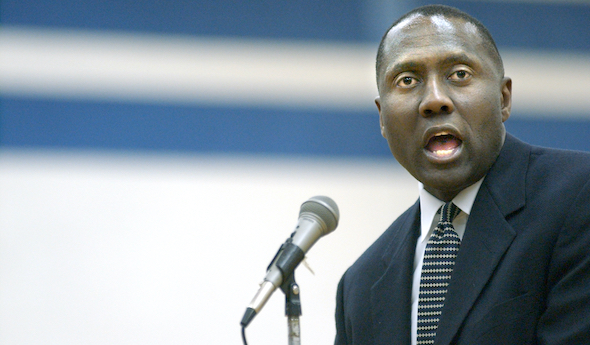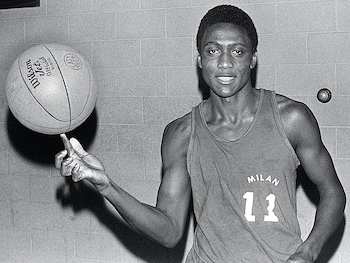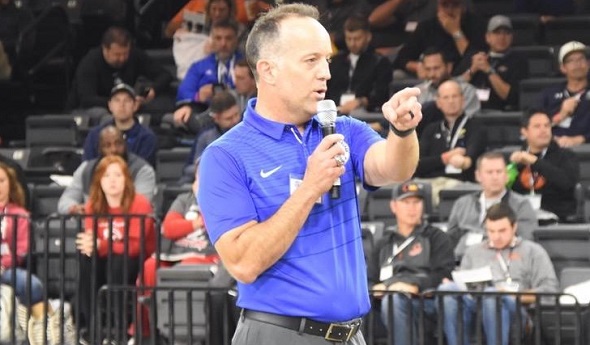
Joplin Always Has Known Value of Home
By
Doug Donnelly
Special for MHSAA.com
July 9, 2020
It is no accident that Stan Joplin has never ventured too far from his hometown of Milan on the border of Monroe and Washtenaw Counties in extreme southeast Michigan.
 In fact, that has been by design.
In fact, that has been by design.
“Mr. (Phil) Barnes once told me that you never want to get too far from home,” Joplin said recently, recalling one of his high school administrators. “If you are close by your home, people will remember you.”
It has been more than 40 years since Joplin played basketball at Milan, and no one is forgetting him anytime soon.
A coach at the high school and Division I collegiate levels and then high school again over nearly 40 years, the 63-year-old Joplin is two seasons removed from his last tenure leading the program at Sylvania Southview. But those decades of wisdom continue to be passed on to Southview students as Joplin serves as an assistant principal at the high school.
“The farthest I ever lived from Milan was when I was coaching at Kent State,” he said. “I’ve remained in southeast Michigan or northwest Ohio all of these years. I have been very fortunate to have the opportunity to stay close to home and receive a good education. You can’t put a price on education. Sooner or later, basketball was going to come to an end.”
It gave him a running start at the beginning.
One of the first four-year starters in Monroe County Region history, Joplin grew up around the game. People like Barnes, coach Ron Dingman and Ann Arbor’s Sandy Sanders all played key roles in Joplin’s early success.
Barnes was a mentor, offering advice and some key life lessons. Dingman was the coach who inserted Joplin into the starting lineup as soon as he could and kept him there as he led the Big Reds in scoring and was named team MVP four consecutive seasons. Sanders was a local basketball guru with connections from Ann Arbor to Detroit.
“Mr. Sanders was umpiring a baseball game and saw me shooting over at the elementary school,” Joplin said. “He invited me to come up to Ann Arbor to play.”
Sanders saw the basketball talent in Joplin and put him on the court in Ann Arbor with other prep talent and some University of Michigan players.
“That’s where I met guys like Campy Russell and Joe Johnson,” Joplin said.
Sanders took area players – including Joplin – to Detroit to play at the famed St. Cecilia Gym. St. Cecilia is well-known in basketball circles for hosting standouts like George Gervin, Magic Johnson and, more recently, Jalen Rose.
“You can imagine what kind of eye-opening experience that was,” Joplin said. “It showed me how hard I had to work. That was huge for me. That really exposed me to basketball.”
Growing up, his neighbor played basketball at Milan, and Joplin would get to go to all the games to watch him. Joplin read about Milan and other local basketball players in the Ypsilanti Press, Ann Arbor News and Monroe News, soaking up everything he could about the game.
“I just wanted to be an athlete,” he said.
He was more than just an athlete. An all-stater, he scored more than 1,500 career points – still a Milan record – and was recruited to play at the University of Toledo for Bobby Nichols.
 “It was the perfect situation,” Joplin said of growing up where he did. “Milan was a small town. A lot of the students I went to elementary school with I spent my whole time in school with. I knew everyone in the city.”
“It was the perfect situation,” Joplin said of growing up where he did. “Milan was a small town. A lot of the students I went to elementary school with I spent my whole time in school with. I knew everyone in the city.”
At Toledo, Joplin blossomed into an all-around player with a knack for elevating his game during key moments. He was named second team all-Mid-American Conference in 1977-78 and 1978-79. The 1979 Rockets won the MAC championship and made the NCAA Tournament. It was there that Joplin had the biggest moment of his career when he knocked down a 20-foot jumper to beat Iowa, 74-72, in the first round. The Rockets would lose a close game in the second round to a Notre Dame team that included four future NBA players. During Joplin’s four years at Toledo, the Rockets went 82-27.
While making national headlines, Joplin also was earning his education, something that Barnes encouraged along the way.
“I followed in his footsteps, went to college, got my degree and went into administration,” Joplin said.
After graduating from UT’s College of Education in 1979, Joplin began coaching at the high school level and was soon head coach at Toledo Start High School. He went on to become an assistant at Kent State University then joined the Rockets’ coaching staff during which time he earned a Master of Administration degree. He would later join the Michigan State University staff with Jud Heathcote and Tom Izzo.
In 1996, Joplin was named head coach at his alma mater, where he remained for 12 years, going 203-155 overall and making the NIT field four times. After he was let go following the 2007-08 campaign, Joplin reached into his education background to become an administrator in the Toledo area. He probably could have landed an assistant coaching job somewhere because of his connections in the sport, but chose not to go that route. He remained close to home.
He coached for a few seasons at Holland (Ohio) Springfield and one year at Sylvania Southview but is enjoying being a basketball fan these days.
“Basketball is the one thing I’ve done my whole life. I miss coaching, but I don’t need it,” he said.
Joplin goes to most of the Southview games and will go on the road occasionally to watch games in which some of his former players are coaching. He gets back to Michigan State University every now and then to watch the Spartans practice and relishes friendships he’s made in the game with people like former University of Michigan head coach Tommy Amaker and former Boston College head coach Al Skinner.
“I’ve got a lot of close friends that I stay in touch with,” he said.
He is not ruling out a return to the sidelines, but is not planning on it, either.
“I watch a lot of basketball. The game has changed,” he said. “The 3-point shot has taken the center out of the game. But, the game itself, is fine.”
Joplin is in the hallways more than the gym these days at Southview. His students know more about Mr. Joplin the school administrator than Stan Joplin the legendary basketball player from Milan – and he is fine with that.
“Every once in a while, someone will say something or bring me a video and say, ‘Hey, Mr. Joplin, I didn’t know you played.’ I just tell them that’s not me, that is just some guy with a lot more hair. It’s become kind of a running joke.”
Made in Michigan 2020
June 24: Fracassa's Remarkable Records Still Rule - Read
June 16: Muskegon Grad Casts "Magic" in HBO Series - Read
 Doug Donnelly has served as a sports and news reporter and city editor over 25 years, writing for the Daily Chief-Union in Upper Sandusky, Ohio from 1992-1995, the Monroe Evening News from 1995-2012 and the Adrian Daily Telegram since 2013. He's also written a book on high school basketball in Monroe County and compiles record books for various schools in southeast Michigan. E-mail him at [email protected] with story ideas for Jackson, Washtenaw, Hillsdale, Lenawee and Monroe counties.
Doug Donnelly has served as a sports and news reporter and city editor over 25 years, writing for the Daily Chief-Union in Upper Sandusky, Ohio from 1992-1995, the Monroe Evening News from 1995-2012 and the Adrian Daily Telegram since 2013. He's also written a book on high school basketball in Monroe County and compiles record books for various schools in southeast Michigan. E-mail him at [email protected] with story ideas for Jackson, Washtenaw, Hillsdale, Lenawee and Monroe counties.
PHOTOS: (Top) Milan basketball legend Stan Joplin serves as an assistant principal at Sylvania Southview High School. (Middle) Joplin still owns the career scoring record at Milan.

Young to Lead BCAM's Next Generation
By
Tom Markowski
Special for Second Half
November 30, 2018
PLYMOUTH – The Basketball Coaches Association of Michigan recently celebrated its 42nd year – and starting Jan. 1, BCAM will welcome just its fourth executive director.
 Tom Hursey, 74, will step down as executive director and hand the gavel over to Dan Young, Hursey’s assistant since 2010.
Tom Hursey, 74, will step down as executive director and hand the gavel over to Dan Young, Hursey’s assistant since 2010.
Young, 50, has been on the BCAM Board of Directors since 1999 and a BCAM member since 1994. He was a boys varsity head coach for 15 years spread over three schools and most recently coached the girls program at Salem (2016-18). He also coaches the boys and girls golf teams at Plymouth.
BCAM got its start in the early 1970s when Hursey, then the boys varsity head coach at Midland High; Ron Vondette, then the boys varsity coach at Carrollton; and other coaches in the Midland-Saginaw area formed the Mid-Michigan Basketball Coaches Association. Hursey and Vondette quickly learned that coaches throughout the state were interested in forming an association, and in 1976 the Michigan High School Basketball Coaches Association was formed. Seven years later, the name changed to what it is known as today – BCAM.
The goal of BCAM and its members is simple – to improve and help the sport grow at all levels.
But the challenges Young faces are quite different from those Hursey confronted when he became executive director in 1997. College recruiting has intensified over the past 20 years, and student-athletes transferring from one high school to another also has become more of a concern for BCAM and the Michigan High School Athletic Association.
In addition, Young said there are other topics his association is currently addressing.
“The buzz right now is seeding,” Young said. “And there’s a committee looking at adding two more games to the season, over the holidays (teams are currently limited to 20 regular season games). Tom and I will meet with (a representative from) the MHSAA to discuss the June camps.”
Though just in its preliminary stages, BCAM, in cooperation with the MHSAA, is seriously considering sponsoring a one-day camp for the top players in the state regardless of class. This is in response to the recommendations made last April by a commission led by Condoleezza Rice, the former U.S. Secretary of State, to aid college coaches in the recruitment of student-athletes. Simply put, the NCAA is attempting to limit how much influence AAU basketball has on the recruitment of high school students, and thereby allow high school coaches to have more influence over their players.
These camps, like the MHSAA/BCAM-sponsored Reaching Higher, allow a large number of players, often more than 100, to receive coaching from high school coaches with college coaches in the gym to evaluate. These also feature speakers who address topics such as entrance tests and what it takes to succeed at the next level, academically and athletically.
Young said the next version could be a two-day event, but he does have some concerns.
“We don’t want to disrupt team camps,” he said. “We’d like to run it with the culture of a team camp. It’s still in its early stages, but I think we’d like to get the top 100 or so players, those that are Division I type of players, and have coaches like (Michigan State coach) Tom Izzo, (Michigan coach) John Beilein, Greg Kampe from Oakland and others be there. Maybe it’ll lasts eight hours. Maybe six. We’d have guest speakers, too.
“It’s possible we’d only invite 60 or 70. We’d take the seniors being recruited by Division I schools, as well as the juniors and sophomores.”
 The camp discussion is an example of why the transition is sure to be a smooth one. Hursey and Young are of one mind on the vast majority of issues BCAM faces. Though a generation apart, they see eye-to-eye on matters of importance. They discuss which battles should be fought and those they should avoid.
The camp discussion is an example of why the transition is sure to be a smooth one. Hursey and Young are of one mind on the vast majority of issues BCAM faces. Though a generation apart, they see eye-to-eye on matters of importance. They discuss which battles should be fought and those they should avoid.
In many ways the transition is similar to that which took place within the MHSAA recently with Mark Uyl taking over for Jack Roberts as executive director. Uyl, 25 years Roberts’ junior, has stated that Roberts has left a legacy, and that he hopes to follow up on that legacy.
“Now that Mark Uyl has taken over, like Dan, a new generation has taken over,” Hursey said.
Hursey and Young are hoping seeding will be introduced within the boys and girls tournaments in the next year or two.
On the subject of transfers, Hursey and Young support the new rule instituted by the MHSAA, which states, in part, that a student who transfers will be ineligible for one full school year at the new school in any sports she or he participated in the previous year at the former school (but eligible immediately in all other sports).
Another concern with regard to transfers is the increasing numbers of top-level players leaving the state and enrolling at prep schools, like Findley Prep in Nevada and others. The most recent top player is Mark “Rocket” Watts who left Old Redford Academy in Detroit and is now enrolled at Spire Academy in Ohio. Watts was considered one of the top candidates for the Mr. Basketball Award, sponsored by BCAM.
Beyond educating players and coaches, and possibly parents, Hursey and Young say there’s little they can do from preventing parents from taking their child out of state.
“It’s a sign of the times,” Hursey said. “Dan and I met with Izzo and we talked for two hours about this. Izzo opened our eyes about it. Take the Old Redford (student). They offer him a beautiful dorm to live in, three square meals and the chance to travel around the country. How are we supposed to compete with that? Izzo said they’re playing 30-to-40 games but that only 10 or so are against the best teams. Those are the ones you see on TV.
“There are a lot of positives for staying with your high school. There’s a lot to be said about high school sports being played at a certain level. And there’s nothing like a Friday night basketball game played in front of 2,000 fans and the place rocking. We just have to keep with what we’re doing. We have to educate the coaches. Some of these fly-by-night operations don’t concentrate on the academic part of school. Yeah, we might lose some of our best players, but there are a lot of good players in this state and there still is great basketball being played. This is not just happening in Michigan. We met with the National (High School) Basketball Coaches Association. It’s a problem throughout the country. How can we compete with millionaires?”
Young said BCAM will continue to do what it does best, and that’s to serve coaches throughout the state and promote and help to improve the game through its many clinics and camps. The website, www.bcam.org, has been improved and updated recently, and provides members and nonmembers alike valuable information.
 Tom Markowski is a correspondent for the State Champs! Sports Network and previously directed its web coverage. He also covered primarily high school sports for the The Detroit News from 1984-2014, focusing on the Detroit area and contributing to statewide coverage of football and basketball. Contact him at [email protected] with story ideas for Oakland, Macomb and Wayne counties.
Tom Markowski is a correspondent for the State Champs! Sports Network and previously directed its web coverage. He also covered primarily high school sports for the The Detroit News from 1984-2014, focusing on the Detroit area and contributing to statewide coverage of football and basketball. Contact him at [email protected] with story ideas for Oakland, Macomb and Wayne counties.
PHOTOS: (Top) Incoming BCAM executive director Dan Young speaks during an event. (Middle) Young and longtime BCAM executive director Tom Hursey, far right, with University of Michigan men’s basketball coach John Beilein. (Photos courtesy of Dan Young.)

